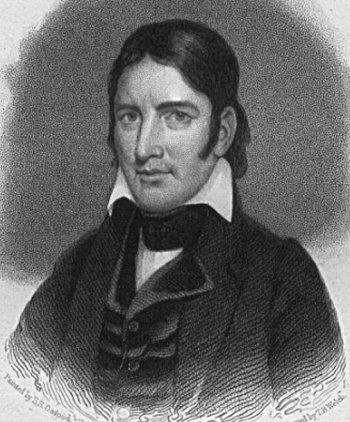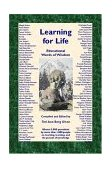

 Davy Crockett David “Davy” Crockett is one of America’s best-known folk heroes, immortalized as “King of the Wild Frontier.” He was a hunter, fighter, statesman, and storyteller. Crockett reached legendary status in his own lifetime, having been turned into a mythical character like Paul Bunyan. Crockett himself excelled at the “backwoods brag,” a type of country exaggeration; and he told many a “tall tale,” a popular type of humor on the American frontier. Davy was born in Tennessee on August 17, 1786. A replica of his birthplace cabin stands in Davy Crockett Birthplace State Park on the Nolichucky River near Limestone, Tennessee. Davy was the fifth of nine children born to John and Rebecca Hawkins Crockett. The Crocketts were descended from Monsieur de la Croquetagne, a captain in the Royal Guard of King Louis XIV. As Huguenots, the Croquetagne family had fled France in the 17th century and migrated to Ireland. Their name was changed to Crockett when they moved to the New World. Davy was named after his grandfather who settled near present-day Rogersville, Tennessee. The elder Davy Crockett and his wife were massacred by Indians in 1777, when their sons were away in the Revolutionary army. Davy’s father, John Wesley Crockett, was one of the Overmountain Men who fought in the American Revolution at the Battle of Kings Mountain. Life in the wilderness was difficult, but the Crocketts were a self-sufficient, independent family. These years were filled with adventure, travel, and hardship. Davy grew up in the hills and river valleys of eastern Tennessee, where he went hunting with his older brothers. There was no school, and Davy did not receive any book learning. However, he had already gained a reputation for storytelling and marksmanship at an early age. John Crockett repeatedly moved his family in an effort to find a good place to live. When Davy was 8, their home and the lumber mill that his father had built were both washed away in a spring flood. In 1796, the Crocketts built a log tavern on the stage route between Knoxville, Tennessee and Abingdon, Virginia. A reconstruction of that tavern now stands on the site and serves as a museum. At the tavern, young Davy would have heard many tales told by travelers which sparked his own desire to explore America. When Davy was 12 or 13, he spent four days at the school of Benjamin Kitchen. But Davy played hooky after having “whupped the tar” out of a bully who had embarrassed him on his first day. Davy’s father found out that his son was not attending school, and he was angry that the goods he traded for his son’s education were going to waste. After a heated argument, Davy ran away from home. Willing to try his hand at anything, Davy spent three years wandering from town to town doing odd jobs. He was a plowboy on a farm, a clean up boy at a mill, apprentice to a hat maker, and he helped bring a team of horses and a herd of cattle to Virginia (a distance of 400 miles). He also polished his hunting and trapping skills – and all the while he was growing tall and strong. Around the time of his 16th birthday, Davy returned home unannounced and his family hardly recognized him at first. The Crockett family was thankful to have Davy back. His father owed money to a farmer named John Kennedy, so Davy offered to work off the debt. “The son of Davy’s employer conducted a school near-by, to which, for six months, Davy went four days a week and worked two. Except for the four days he had attended school when he was twelve, this was all the schooling Davy ever had.” He basically learned to read, to write, and to “cypher,” meaning to add and subtract. Davy married Mary (Polly) Finley on August 16, 1806, the day before his 20th birthday. They lived for the next few years in a small cabin near Crockett’s parents. Davy and Polly had two sons and a daughter. Davy was a skilled hunter and trapper who was able to provide food and clothing for his family. He travelled around the Mississippi Valley region as a fur trader, where he also became familiar with the Indians and their customs. In 1813, Crockett became a U.S. Army scout. Creek Indian warriors had killed many settlers at Fort Mims, Alabama. Crockett fought under General Andrew Jackson, another Tennessee native. He rose to the rank of colonel in the Creek Indian War of 1813-14, sometimes considered to be part of the War of 1812. In Alabama, Crockett became infected with malaria and almost died. After he returned home from the war, his wife died. Crockett needed a wife to raise his three children. In 1815, Davy married a widow named Elizabeth Patton and they also had three children. Crockett developed an interest in politics after his appointment as a local court official. He served as a member of the Tennessee legislature from 1821-1824. Three years later, Crockett accepted a dare to run for U.S. Congress. Much to his surprise, he was elected for three terms between 1827 and 1835. Crockett was a colorful character who told “big brag” stories and wore leather clothes with a squirrel-skin hat. He became a beloved figure in Washington and was highly esteemed by his fellow Congressmen. They found that he was quite intelligent and able to remember almost anything he heard. Crockett once repeated an opponent’s campaign speech word for word! In 1834, he published an autobiography titled A Narrative of the Life of David Crockett. Written by Himself. This was the only work that he actually authored, although Crockett wrote many letters that tell interesting things about American history of that time. Some leaders in the Whig political party were considering Crockett as their next candidate for President, and in preparation they ghostwrote other books for him that were full of frontier idioms, heroic bear hunting, and Indian fighting. He gained worldwide fame with The Crockett Almanacks, first published in 1835. Several artists made paintings of him, while popular songs and plays were also written about him and his adventures. Crockett vehemently opposed President Andrew Jackson’s land reform and Indian policies, most notably the Indian Removal and Resettlement Act which he argued was inhumane treatment of the Indian Nations. Crockett lost the election of 1835 and his political future was over. Nevertheless, to be a member of the Tennessee legislature and then serve honorably in the U.S. House of Representatives for several years was quite impressive for someone with less than six months of formal schooling. Following his defeat, Crockett decided to explore the western area of Texas. As a lawmaker, he had become an expert in land policy, especially in wilderness areas. So he thought that he might become a land agent for the new territory. He figured on moving his whole family out there if the prospects looked promising. His last letter, dated January 9, 1836, stated: “I must say as to what I have seen of Texas it is the garden spot of the world. The best land and the best prospects for health I ever saw, and I do believe it is a fortune to any man to come here. There is a world of country here to settle. . . . I have but little doubt of being elected a member to form a constitution for this province. I am rejoiced at my fate. I had rather be in my present situation than to be elected to a seat in Congress for life. I am in hopes of making a fortune yet for myself and family.” Crockett did not intend to join the American settlers who were trying to gain independence from Mexico. But at San Antonio, Crockett volunteered to help defend the Alamo along with more than one hundred eighty men who had established a fort at the old Roman Catholic mission. Crockett was killed on March 6, 1836, when the fort fell to the Mexican army led by General Santa Anna. His tombstone reads: “Davy Crockett, Pioneer, Patriot, Soldier, Trapper, Explorer, State Legislator, Congressman. Martyred at The Alamo. 1786-1836.” Crockett’s death at the Alamo unleashed a long flood of biographies and dime novels, all of which further served to inflate him to superhero status. As a result, biographers have a hard time trying to sort out the facts from the fables. But what we do know is, he was trained not in the school of books, but in the school of experience. He exhibited true manliness, honesty and bravery in all of his words and actions. Davy Crockett personified the spirit of the American wilderness and succeeded Daniel Boone as a representative of frontier virtue. Dedicated to the principles of justice that guided him throughout his life, Crockett had lived by the motto: “I leave this rule for others when I'm dead. Be always sure you're right — THEN GO AHEAD!” Fun Facts About Davy Crockett (from http://thomas.loc.gov/cgi-bin/query/z?c108:H.R.3526:)
The Ballad of Davy Crockett
Version as produced for Walt Disney Records
Born on a mountain top in Tennessee
Fought single-handed through many a war
He went off to Congress and served a spell
When he came home his politic'ing was done Listen to the full version of the song here: http://www.youtube.com/watch?v=bff8NCdTl-A References: http://www.americanwest.com/pages/davycroc.htm http://www.tn.gov/environment/parks/DavyCrockettSHP/features/historic.shtml http://www.tshaonline.org/handbook/online/articles/fcr24 http://www.whosyomama.com/gabroaddrick3/4/27839.htm http://etext.virginia.edu/railton/projects/price/acrocket.htm http://www.personalliberty.com/liberty/sockdolager-a-tale-of-davy-crockett-charity-and-congress/
A Narrative of the Life of David Crockett, Written by Himself
The Life of Colonel David Crockett
A Narrative of the Life of David Crockett of the State of Tennessee
Davy Crockett: His Own Story
Davy Crockett -Two Movie Set Free e-book of David Crockett at Project Gutenberg
Contact: . Thanks! Please click here for reprint permission.


These pages are a continuous work in progress.
|
Help Support this Site
and purchase items via our affiliate links. Thank you!
 
Thank you for visiting my |

